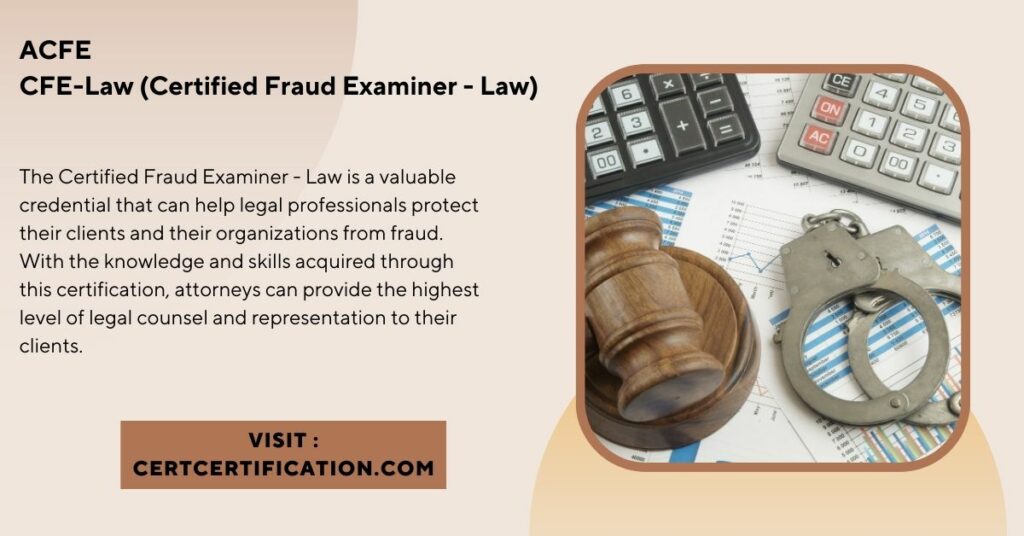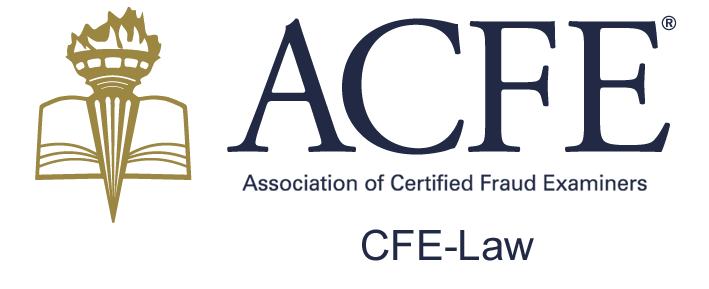Key Takeaways
Certified fraud examiners (CFE) need robust education and experience.
CFE (Certified Fraud Examiner) certification involves exam passage and eligibility fulfillment.
Certified fraud examiners perform specialized accounting duties, requiring strong education and experience. Candidates must pass an exam and earn certification.
CFE (Certified Fraud Examiner) certification requires considerable preparation, meeting minimum educational and professional requirements. Eligibility depends on the ACFE's point system.
Candidates typically hold a bachelor’s degree or higher, receiving points towards certification eligibility. Those without traditional education may qualify based on years of study or professional experience.
Bachelor's-educated candidates need at least two years of relevant experience. Professionals can replace education with years of experience if they score enough points.
The CFE (Certified Fraud Examiner) exam covers financial transactions, law, investigation, and fraud prevention. Test-takers can complete sections online through Prometric, with up to two hours per section and 30 days to finish.
Candidates register through the ACFE's website, providing qualifications, experience, and character information, along with payment. Applications should be submitted at least 30 days before the exam.
Test-takers receive a confirmation email within 5-7 days of submission. Applications remain valid for two years, and exams can be taken year-round.
Introduction
A Certified Fraud Examiner - Law is a professional credential awarded by the Association of Certified Fraud Examiners (ACFE) to individuals who have demonstrated a proficient level of knowledge in the field of fraud examination and investigation. CFEs possess the specialized skills needed to detect and prevent fraud, as well as investigate instances of fraud and financial crime. CFEs must also adhere to the ACFE's Code of Professional Ethics and comply with the organization's standards of practice. With the rise in fraud cases, CFEs have become increasingly important in the legal field.
They are relied upon to investigate and provide evidence for cases involving fraud and financial crime, as well as consult with businesses to help prevent instances of fraud. CFEs must also have a thorough understanding of the law and its application to fraud cases.
What a Certified Fraud Examiner - Law (CFE-Law) Can Do To Help You Fight Fraud
A Certified Fraud Examiner - Law is a professional who has acquired the necessary training and skills to investigate and detect suspected fraud within a business. CFEs are typically employed by businesses, government agencies, and law enforcement to help identify any potential fraud or abuse within their organization.
CFEs possess a wide range of skills that can be used to detect and prevent fraud. These include conducting data analysis and interviews, obtaining financial records, and developing strategies for preventing future fraud. CFEs are also knowledgeable in the legal aspects of fraud, such as contract law, criminal law, and securities law.
CFEs are well-equipped to help you fight fraud in your organization. They can help you determine the extent of any fraud, identify the parties involved, and provide strategies for preventing future fraud. CFEs have the experience and expertise to thoroughly investigate allegations of potential fraud.
CFEs can also provide advice on how to strengthen your internal controls and procedures to prevent fraud. They can review your existing processes and procedures and recommend changes to strengthen your internal control environment. This can include implementing tighter access control measures, introducing stronger accounting policies, and reviewing key personnel to ensure that they are held accountable for their actions.
Additionally, CFEs can provide training to your staff on how to identify and respond to any potential fraud. This training can help your staff recognize any suspicious activity and take appropriate action to report it.
In conclusion, a Certified Fraud Examiner can provide invaluable assistance in the fight against fraud. CFEs possess the expertise and skills necessary to thoroughly investigate any suspected fraud and provide advice on how to strengthen your organization’s internal controls. By engaging a CFE, your organization can take proactive steps to combat fraud and ensure its long-term success.

The Benefits of Hiring a Certified Fraud Examiner - Law
Hiring a Certified Fraud Examiner - Law can be highly beneficial for any individual or business that is facing potential fraud or has experienced financial loss due to fraudulent activity. A CFE is a highly trained professional who is certified in the prevention, detection, and investigation of fraud. A CFE can provide specialized services such as forensic accounting, financial investigations, and asset tracing.
The primary benefit of hiring a CFE is that they have the knowledge and expertise to accurately detect and investigate fraud. A CFE is an expert in the field of fraud prevention and investigation. They have the experience to identify potential fraud indicators, analyze financial statements, and implement effective fraud prevention strategies. A CFE can also provide valuable insight into the financial health of a business and identify areas where fraud may be occurring.
A CFE is also skilled at collecting and analyzing evidence. They have the tools and resources to thoroughly investigate a fraud case and uncover any wrongdoing. They can help identify any weak points in the system and develop a plan to prevent future fraud.
A CFE can also be a valuable asset when it comes to litigation. They have the ability to present evidence in court and provide expert testimony. This can be especially beneficial if the case goes to trial.
Overall, a CFE can provide a valuable service for businesses and individuals who have been impacted by fraud. They have the knowledge and expertise to accurately detect and investigate fraud, and can provide valuable insight into the financial health of a business. In addition, they are skilled at collecting and analyzing evidence and can be a valuable asset in litigation. For these reasons, hiring a CFE can be a smart decision for anyone who is facing potential fraud or has experienced financial loss due to fraudulent activity.
How to Become a Certified Fraud Examiner - Law
Becoming a Certified Fraud Examiner - Law is a rewarding and challenging career path, requiring a combination of specialized knowledge, training, and experience. The CFE credential is the gold standard for those in the field of fraud examination.
The first step in becoming a CFE is to complete the Certified Fraud Examiner - Law Exam. The exam is administered by the Association of Certified Fraud Examiners (ACFE), a professional organization dedicated to promoting and fighting fraud. The exam covers topics such as fraud prevention, detection, investigation and analysis. It is a multiple-choice exam that takes about four hours to complete.
The next step is to fulfill the experience requirements for the CFE credential. You must have at least two years of full-time professional experience in the field of fraud examination, or an equivalent combination of education and experience. This experience must include investigating, auditing or consulting on fraud matters.
Once you have met the experience requirements, you can apply for the CFE credential. The application process includes completing an online application, passing a background check, and submitting two professional references.
Once your application is accepted, you must complete the CFE Certification Course. This course covers topics such as financial statement fraud, digital forensics, and forensic accounting. The course is offered in both online and classroom formats.
Finally, to maintain your CFE credential, you must complete a minimum of 20 hours of continuing professional education (CPE) every two years. The CPE requirement can be fulfilled through a variety of activities, such as attending conferences, taking online courses, or reading books and articles related to fraud examination.
By following these steps, you can become a Certified Fraud Examiner and join the ranks of professionals dedicated to preventing, detecting, and investigating fraudulent activity.
The Impact of a Certified Fraud Examiner - Law on Fraud Detection and Prevention
The role of a Certified Fraud Examiner - Law in fraud detection and prevention is significant. A CFE is a professional who is qualified to investigate and prevent fraud in organizations, businesses, and government. With years of experience and specialized training, CFEs are experts in analyzing financial documents, tracing transactions, gathering evidence, and interviewing individuals in order to detect and prevent fraud.
A CFE is trained to identify areas of potential fraud and understand how criminals work. They are skilled in reviewing financial documents and uncovering any unusual patterns or discrepancies. CFEs can also assess a company’s internal controls and procedures and make recommendations for improvements. Additionally, they can provide expert advice on how to prevent fraud from occurring in the future.
CFEs are also useful in responding to suspected fraud. They are able to conduct thorough investigations to determine if fraud has indeed occurred and to identify the perpetrators. CFEs can also provide valuable testimony in court proceedings related to fraud and other financial crimes.
In addition to their skills in fraud detection and prevention, CFEs are also invaluable in educating organizations on how to detect and prevent fraud. They can provide guidance on how to develop fraud prevention policies and procedures, as well as how to train employees on recognizing and reporting fraud. CFEs are also useful in helping organizations to develop a culture of integrity and compliance.
Overall, the impact of a CFE on fraud detection and prevention is significant. Their specialized knowledge and experience in fraud investigations can be invaluable in helping organizations to detect and prevent fraud. Moreover, their guidance on developing policies and procedures, training employees, and creating an environment of compliance can all help to reduce the risk of fraud.

Conclusion
The Certified Fraud Examiner - Law is a valuable credential that can help legal professionals protect their clients and their organizations from fraud. With the knowledge and skills acquired through this certification, attorneys can provide the highest level of legal counsel and representation to their clients. Certified Fraud Examiner - Law are highly trained and highly sought after professionals, and their expertise can be a valuable asset for any business or organization.
Comments (0)